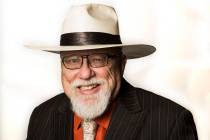Need a why for Desai? Maybe it’s the water
After six months of studying Dr. Dipak Desai as he lived in a nuthouse in Sparks, three of the state's best shrinks concluded, in effect, that he knows the difference between an outhouse and a courthouse, that he remains competent enough to tell his lawyer, Richard Wright, to keep stalling so he doesn't go to trial.
So Judge Kathleen Delaney ruled recently that he can go to trial.
If he can't be portrayed as a victim of strokes, as Wright had hoped, how might Desai, the central figure in the 2007 hepatitis outbreak in Las Vegas, still be portrayed as a victim?
You know and I know, whether you're following a heinous criminal case in the newspaper or on "Law & Order," that it has become practically mandatory for the defendant to be the victim of something, whether it's mean parents, too much television or too much sugar.
Without a little sympathy for the guy on trial -- even if he's ripped an elderly woman's throat out for a quarter in front of a national TV audience -- you sense that a judge might call a mistrial if a few tears aren't shed for the defendant.
So in the spirit of a truly fair and empathetic trial, in an age of green where environmentalists warn us every day that unclean air and water can affect our vital organs -- including the brains we think with -- I submit this argument: Dr. Dipak Desai is a possible victim of water pollution, from water so foul that it could have affected his thought processes.
Don't laugh. This is an argument that could be grounded both in medicine and science, one that the creative Wright might already be thinking about using. He refused to say in an recent interview what his new trial tactics would be, assuring me only that he wouldn't delay the proceedings the way District Judge Donald Mosley no doubt did by announcing he would retire March 2, just before scheduled trial date.
"I don't cut and run," Wright said.
Think about it. Desai's acquaintances told me, as I prepared a lengthy profile on the physician in 2008, that he traveled to his native India on religious pilgrimages where he joins millions of other Hindus in trying to wash earthly sins away in the Ganges River -- one of the five most polluted rivers in the world, a body of water infested with brain-changing chemicals, feces and dead bodies.
The Ganges River pollution is so bad that the amount of toxins, chemicals and other dangerous bacteria found in the river is almost 3,000 times over the limit suggested by the World Health Organization as "safe." Some scientists suggest that 80 percent of all illnesses in India and one-third of deaths there can be attributed to water-borne diseases.
Yet Desai was willing to immerse himself in these waters.
So much for what you learn in medical school.
It is common for Hindus to not only bathe in the Ganges, which is considered a sacred and purifying water, but to drink from it.
In 2008, Gopala Krishna, the priest at the Hindu temple in Summerlin, told me that Desai is a very religious man.
One of the heavy metals found in the Ganges is lead, which Dr. Herbert Needleman of the University of Pittsburgh found is associated with antisocial behavior. It was Needleman's research that was instrumental in bans on lead in paint, gasoline and food and beverage cans in the United States.
Could Desai have become full of so much lead that he was forced into antisocial behavior?
As you know, there are many people, including the 250 or so who say they acquired hepatitis C at his colonoscopy clinics, who consider Desai, at best, antisocial -- guilty of behavior that not only lacks consideration for others but also causes damage to society
Desai, who bragged to other doctors about the millions he was making, is now indicted on charges that include neglect of patients, racketeering and insurance fraud.
Yet is he himself a victim? Sure it's true that people who worked with him said he was a penny-pincher who ordered the reusing of syringes to save money, a dangerous practice that authorities said spread hepatitis.
But what if a polluted holy river turned him into a man the Times of India called Dr. Greed?
Should we now drop charges against Desai and instead have Clark County prosecutors go to the United Nations' International Court of Justice and try to hold India accountable for the hepatitis outbreak in Las Vegas?
Did I really suggest that? Could I have somehow drunk water from the Ganges?
Paul Harasim is the medical reporter for the Las Vegas Review-Journal. His column appears Mondays. Harasim can be reached at pharasim@reviewjournal.com or 702-387-2908.

















